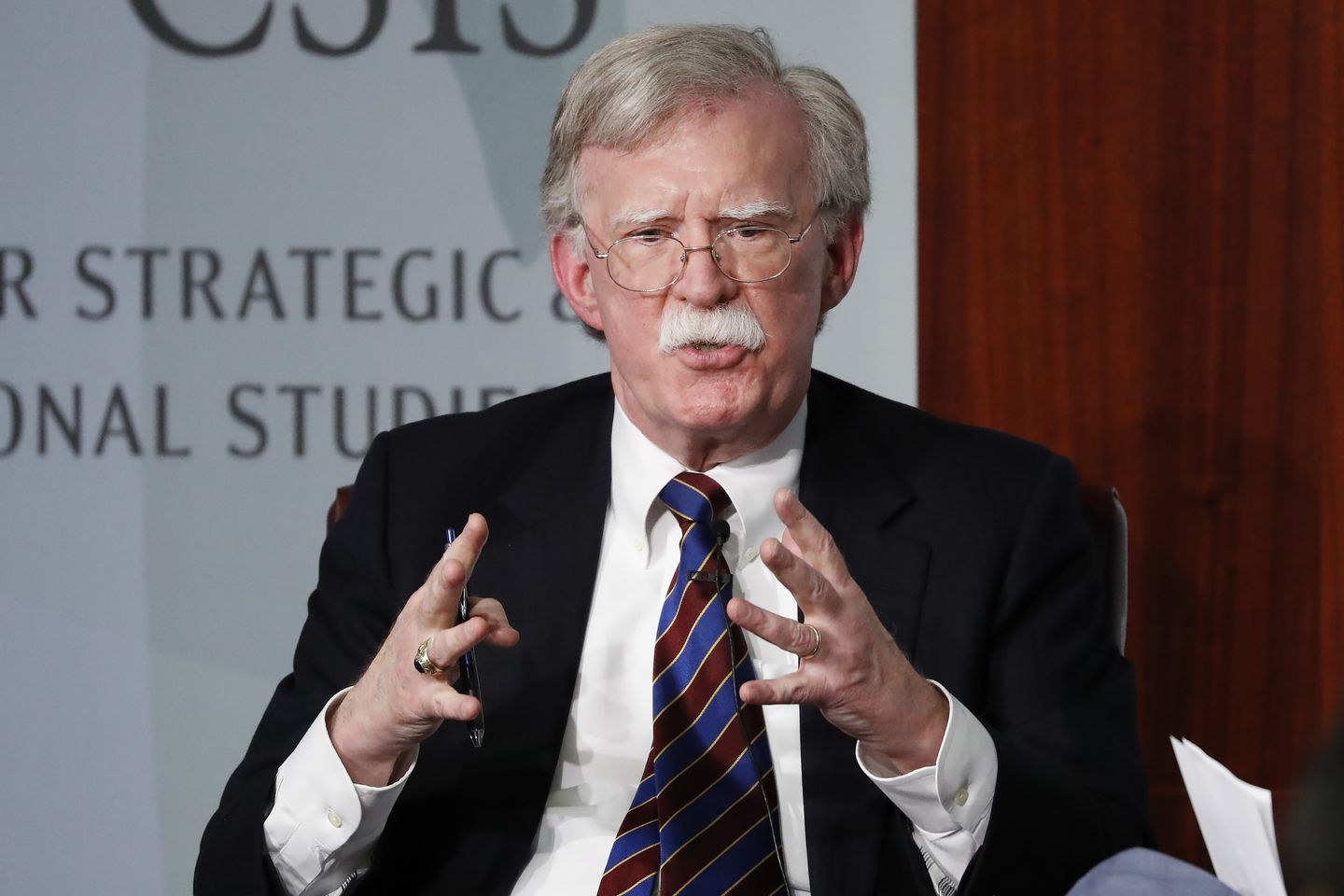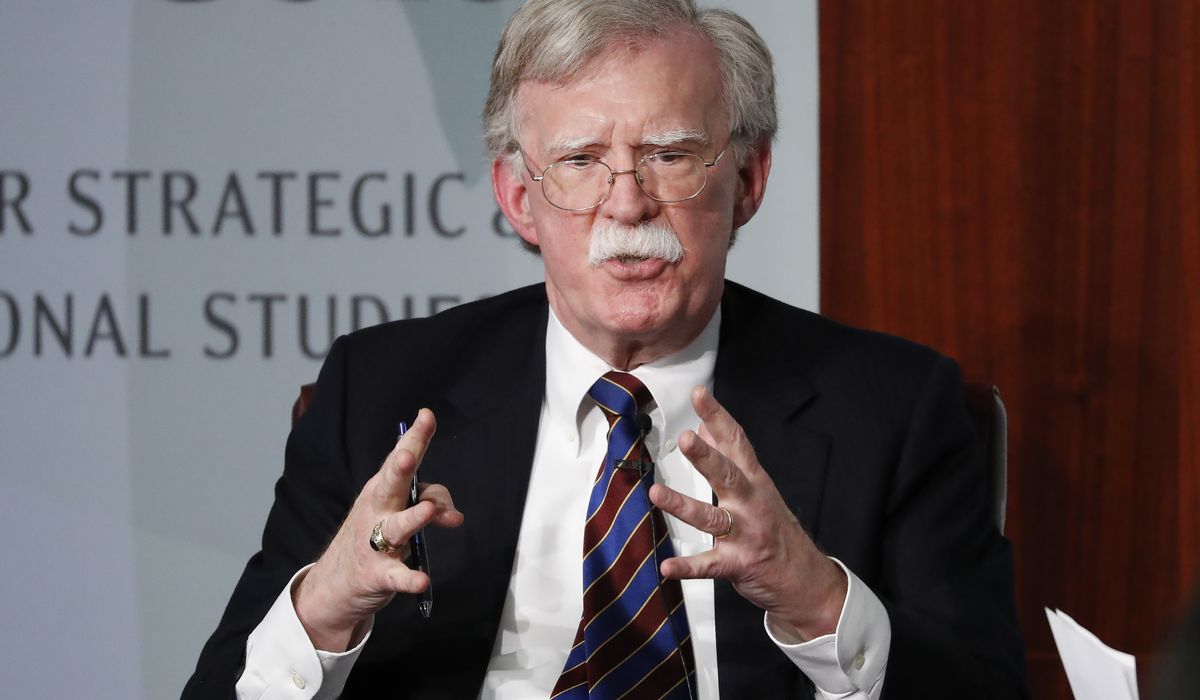

Former National Security Adviser John Bolton says President Biden could be making a “treasonous” deal with Iran if his administration offers guarantees that future U.S. presidents will be constrained from exiting a renewed nuclear accord with the Islamic republic.
Mr. Bolton, an Iran hawk who worked closely with former President Trump to withdraw from the Obama-era nuclear deal back in 2018, said Wednesday that a future Republican administration will undoubtedly seek to overturn whatever agreement the current administration makes with Iran.
His assertions in an exchange with journalists in Washington came amid reports that Iranian negotiators have sought “guarantees” from the Biden administration that Tehran will be “compensated” in the event a future American president pulls out of whatever deal may ultimately be reached.
The Biden administration has not commented on the reports.
State Department spokesperson Ned Price said Wednesday that the administration is reviewing Tehran’s response to a “final text” that the European Union circulated recently with a proposed pathway for restoring the 2015 nuclear deal that sought to limit Iran’s nuclear activities in exchange for sanctions relief.
But it remains unclear whether an agreement is imminent after more than a year of on-again, off-again negotiations that have been carried out against a backdrop of Iranian provocations toward the U.S., including engaging in alleged assassination plots against former Trump administration officials such as Mr. Bolton.
Mr. Price said Wednesday that he could not comment on the state of negotiations with Iran, which have been held behind closed doors.
The State Department and White House have not confirmed that Iran specifically requested guarantees that the deal would be upheld under future administrations.
However, a report by CNN on Tuesday cited a regional diplomat who was briefed on the matter as saying Iranian negotiators remain concerned about the possibility of a future U.S. pullout from a prospective deal.
“The main issue facing the revival of the deal is the guarantees requested from the Iranian side ensuring Iran will be compensated in case future U.S. administrations decide to withdraw again from the deal and while no real solution has been put forth,” the diplomat said.
Mohammed Marandi, an adviser to Iran’s negotiating team, separately confirmed to CNN that Tehran is seeking guarantees that the U.S. will “have to pay a price” if a future U.S. president withdraws from a restored nuclear deal, formally called the Joint Comprehensive Plan of Action (JCPOA).
While it is unclear what specific compensation Iran would seek, Mr. Bolton pounced on the issue Wednesday, asserting that the Islamic republic could pursue a range of avenues to try and impose costs on the U.S. if Iranian officials determined Washington was reneging on a future deal.
“One is this idea of damages, that if a subsequent administration withdrew from the deal, they’d have to pay damages to Iran. That’s been reported in the press in the past couple of weeks,” Mr. Bolton said.
“There were earlier reports weeks and months ago, of a proposition that Iran would be put back in possession of enriched uranium that it may have shipped out to Russia or other countries,” Mr. Bolton said, although The Washington Times was unable to corroborate his claim of such reports on Wednesday.
The former national security adviser went on to assert that “if the Biden administration negotiated those kinds of provisions to harm the United States of America if a future president withdrew from the deal, that verges on treasonous.”
“It’s one thing to say we want to go into this deal and we hope future presidents stay,” Mr. Bolton said. “It’s another to impair the United States itself to reduce the possibility of leaving the deal.”
The U.S. Justice Department last week announced charges against an Iranian Revolutionary Guards Corps (IRGC) operative, accusing him of offering to pay contacts inside the U.S. up to $300,000 to kill the former national security adviser.
Mr. Bolton’s comments on Wednesday followed a panel discussion in Washington on Iran’s nuclear program hosted by the National Council of Resistance of Iran — an organization linked to the Mujahedin-e-Khalq, the exiled Iranian dissident group that first exposed Iran’s secret Natanz nuclear site in 2002.
The Biden administration has been mired in months of stalled negotiations over restoring the 2015 nuclear deal. When Mr. Trump withdrew from the deal in 2018, his administration ramped up pressure on Iran, reimposing sanctions that had been lifted under the terms of the Obama-era deal.
The Trump administration took other actions as well, notably placing the IRGC on the official State Department list of Foreign Terrorist Organizations.
Iran’s full written response to the European Union’s recently circulated “final text” for a restored deal has not been made public. Tehran has made a range of previous demands in its talks with U.S. and European officials over the past year.
Among other things, Iran wants to limit an International Atomic Energy Agency investigation into suspected undeclared nuclear material inside the country. Iran also has indicated that it wants the U.S. and Europe to lift economic sanctions on the IRGC, the elite paramilitary group that the Justice Department claimed was linked directly to the plot to kill Mr. Bolton.
Mr. Price told reporters earlier this week that the Biden administration is not willing to entertain such a move, nor will it lift the IRGC’s designation as a terrorist organization. The State Department spokesperson openly blasted “highly inaccurate reporting” that indicated the U.S. would consider such steps to secure an agreement.
Lawmakers on both sides of the aisle are eyeing the administration’s attempts to restore the nuclear deal with skepticism and have openly criticized the White House for keeping details of the negotiations with Tehran too close to the vest.
President Biden has brushed aside the pushback from lawmakers and held firm in his commitment to resurrect the deal.
Mr. Bolton noted Wednesday that opposition to the deal is growing among Democrats. “The issue of whether to go back into the deal now has more opposition on the Democratic side,” he said. “Far more opposition than existed to entering the deal in the first place in 2015. And I think there are a lot of Democrats, especially looking toward the fall, who are worried about having to defend essentially indefensible policy.”
He asserted that any attempts to restrict a future president’s options toward a renewed deal would inevitably harm the U.S. “It doesn’t matter what this administration says,” Mr. Bolton said. “If a future president wants to withdraw, he’s going to get out period.”
